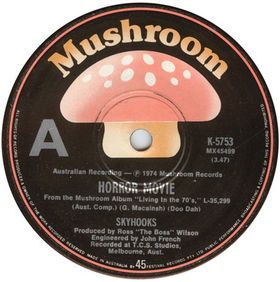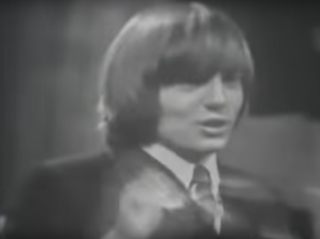Related Research Articles

John Inglis Young, OAM, known professionally as John Paul Young, is an Australian pop singer who had his 1978 worldwide hit with "Love Is in the Air". His career was boosted by regular appearances as a performer and guest host on Countdown, a 1974–1987 TV series for Australia's national broadcaster ABC. Besides "Love Is in the Air", Young had top ten chart success in Germany and the Netherlands with "Standing in the Rain" and four other top ten hits in South Africa, including No. 1 hits with "I Hate the Music" in 1976 and "Yesterday's Hero" in 1975.

Countdown was a weekly Australian music television program that was broadcast by the Australian Broadcasting Corporation from 8 November 1974 until 19 July 1987. It was created by Executive Producer Michael Shrimpton, producer/director Robbie Weekes and record producer and music journalist Ian "Molly" Meldrum. Countdown was produced at the studios of the ABC in the Melbourne suburb of Ripponlea. It was screened Sunday night from 6:00pm to 7:00.
Pseudo Echo are an Australian new wave band that were formed in 1982 by Brian Canham, Pierre Gigliotti, and Tony Lugton (keyboards). Later members included Anthony Argiro (drums), James Leigh (keyboards), and Vince Leigh (drums). In the 1980s, Pseudo Echo had multiple Australian top 20 hits with "Listening", "A Beat for You", "Don't Go", "Love an Adventure", and "Living in a Dream". Their 1986 cover of "Funky Town" was an international success, peaking at No. 1 in Australia and New Zealand and becoming a top ten hit in Sweden, Canada, the United States, and in the United Kingdom.
Rock music in Australia, also known as Oz rock, Australian rock, and Aussie rock, has a rich history, rooted in an appreciation of various rock genres originating in the United States and Britain, and to a lesser extent, in continental Europe and Africa. Australian rock has also contributed to the development of some of these genres, as well as having its own unique Australiana sound with pub rock and its Indigenous music.
Go-Set was the first Australian pop music newspaper, published weekly from 2 February 1966 to 24 August 1974, and was founded in Melbourne by Phillip Frazer, Peter Raphael and Tony Schauble. Widely described as a pop music "bible", it became an influential publication, introduced the first national pop record charts and featured many notable contributors including fashion designer Prue Acton, journalist Lily Brett, rock writer / band manager Vince Lovegrove, music commentator Ian "Molly" Meldrum, rock writer / music historian Ed Nimmervoll and radio DJ Stan Rofe. It spawned the original Australian edition of Rolling Stone magazine in late 1972.
Colleen Hewett is an Australian singer and actress.
The Go!! Show was an Australian popular music television series which was produced before a live audience and aired on Network Ten ATV-0, Melbourne, from August 1964 to August 1967, running one hour three nights a night.
Ronald Leslie BurnsAM is an Australian retired rock singer-songwriter and musician.

"Horror Movie" is a song by Australian band Skyhooks, released in December 1974 as the second and final single from the band's debut studio album, Living in the 70's. The song peaked at number one in Australia, staying there for two weeks in March 1975. The single was greatly helped along by the band's appearance on the then-new ABC pop music TV show Countdown.
The Deakins were an Australian rock group which formed in 1963. This was the era of the local version of beat music; which included 1960s garage rock, proto-punk and pop. Their initial line-up included Jeff W Donoghue on bass guitar, Ian Kinkead on drums, and Bob Millar and Gary Schober on guitars. The later Deakins 'trio' released two singles in 1966, "Tonight You're Gonna Fall in Love with Me" and "Take Me for a Little While", via GO!!. The band regularly appeared on the related TV pop music weekly series, The Go!! Show, and on daily weekday show, Kommotion, both broadcast by ATV-0. The Deakins disbanded in 1973.
Lynne Randell was an English Australian pop singer. For three years in the mid-1960s, she was Australia's most popular female performer and had hits with "Heart" and "Goin' Out of My Head" in 1966, and "Ciao Baby" in 1967. In 1967, Randell toured the United States with The Monkees and performed on-stage with support act Jimi Hendrix. She wrote for teen magazine, Go-Set, and television programme guide, TV Week. While on the US tour, Randell became addicted to methamphetamine, an addiction which she battled for most of her life.
Sunshine Records was an Australian independent pop music record label of the mid-1960s. It was established in late 1964 by promoter Ivan Dayman in collaboration with musician-producer-arranger-songwriter Pat Aulton and entrepreneur, producer and songwriter Nat Kipner. Although his enterprise was short-lived, Dayman was arguably the first Australian popular music entrepreneur to create a fully integrated pop music company that included artist management and bookings, record production, record labels, venue management and concert promotion.
Donald Sutherland OAM is an Australian radio and television presenter. He was the host of TV pop music show Sounds between 1975 and 1987. Sutherland has also worked as a TV producer and music journalist, and is associated with the local greyhound racing industry.
Australian pop music awards are a series of inter-related national awards that gave recognition to popular musical artists and have included the Go-Set pop poll (1966–1972); TV Week King of Pop Awards (1967–1978); TV Week and Countdown Music Awards (1979–1980); the Countdown Awards (1981–1982) and Countdown Music and Video Awards (1983–1987). Early awards were based on popular voting from readers of teenage pop music newspaper Go-Set and television program guide TV Week. They were followed by responses from viewers of Countdown, a TV pop music series (1974–1987) on national broadcaster Australian Broadcasting Corporation (ABC). Some of the later award ceremonies incorporated listed nominees and peer-voted awards. From 1987 the Australian Recording Industry Association (ARIA) instituted its own peer-voted ARIA Music Awards.
The Seventh Australian Recording Industry Association Music Awards was held on 14 April 1993 at the Entertainment Centre in Sydney. Host, Richard Wilkins, was assisted by presenters, James Reyne, Elle Macpherson, Billy Birmingham, Tim Finn, Neil Finn, Daryl Somers and others, to distribute 24 awards. There were live performances and the awards were televised.

Ian Alexander "Molly" Meldrum AM is an Australian music critic, journalist, record producer and musical entrepreneur. He was the talent coordinator, on-air interviewer, and music news presenter on the former popular music program Countdown (1974–87) and is widely recognised for his trademark Stetson hat, which he has regularly worn in public since the 1980s.
Ivan Howard Dayman was an Australian music promoter, record producer, label owner and talent manager of the 1960s and 1970s, based first in Adelaide, then Melbourne, Brisbane and Perth. Although his career was brief – ca. 1964 to 1968 – he is significant in the history of Australian popular music as the first person to establish an integrated entertainment group that included artist management, a booking agency, a chain of venues in major cities, and a recording label. He is also notable for the many successful artists he managed, including his flagship act, Australia's 1960s TV Week "King of Pop", Normie Rowe, whom he managed from 1965 onwards.

Michael Alexander Furber was an English-born Australian entertainer popular in the mid-1960s as the lead singer of Mike Furber and the Bowery Boys. Furber's group had hits with "Just a Poor Boy", "You Stole My Love" and "That's When Happiness Began". In the Go Set Pop Poll, Furber was voted in the top 5 as most popular Male Vocalist in both 1966 and 1967. Furber's subsequent solo singing career was less successful and in the early 1970s he turned to stage musicals: including Godspell and Nuclear. According to police investigators Furber committed suicide on 10 May 1973, by hanging, in the garage of his home. Rock music historian, Ian McFarlane, writes, "Reputedly in the depths of depression, he hanged himself... It has been suggested, however, that Furber was actually murdered because he had befriended a Kings Cross prostitute."

"Yesterday's Hero" is a pop song by John Paul Young. The song was written by George Young and Harry Vanda and was released in February 1975 as the lead single from Young's debut studio album, Hero (1975).

"Listening" is the debut single from Australian pop group Pseudo Echo. The song was released in November 1983 as the lead single from their debut studio album, Autumnal Park (1984). The song peaked at number 4 on the Australian Kent Music Report. Following the international success of "Funky Town", a remixed version of "Listening" was released in 1987 for the movie "North Shore" starring Nia Peeples.
References
- ↑ "Johnny Chester - Year By Year". johnnychester.com. Archived from the original on 11 April 2013. Retrieved 8 March 2013.
- 1 2 Kimball, Duncan. "Kommotion". Milesago. Archived from the original on 8 March 2007. Retrieved 10 May 2017.
- ↑ Meldrum, Ian (12 October 1966). "Kommotion to go on American Television" (PDF). Go-Set . Vol. 1, no. 37. p. 1. Archived (PDF) from the original on 14 July 2019. Retrieved 6 January 2020.